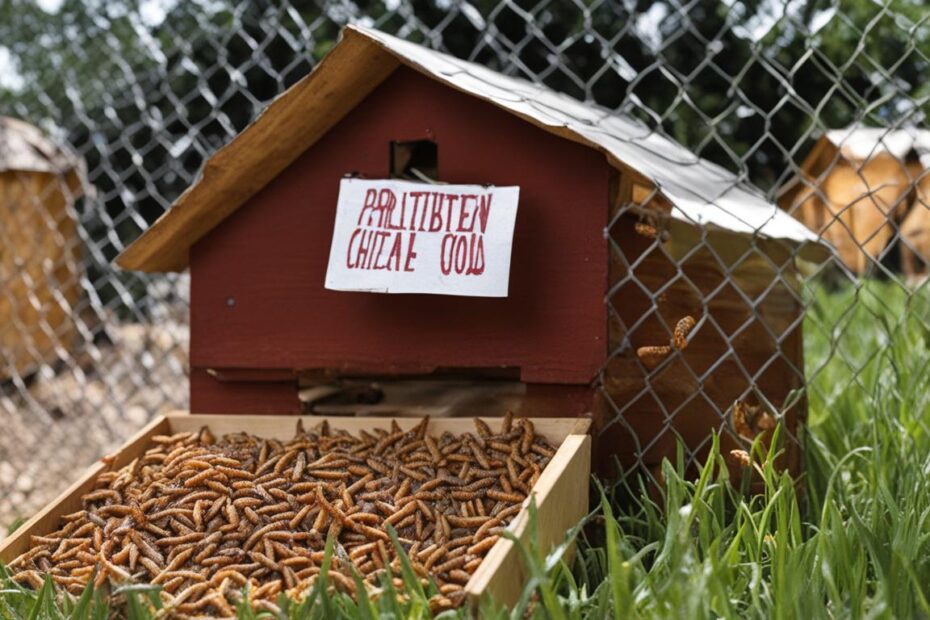Feeding chickens mealworms may seem like a natural and nutritious choice, but did you know that it is actually illegal in certain countries, including the UK and EU? This may come as a surprise, but there are important reasons behind these regulations that aim to protect both the chickens and the people who consume their products.
Mealworms, while rich in protein, can be contaminated with various harmful substances such as bacteria, viruses, pesticides, heavy metals, and toxins. These contaminants pose significant health risks to both the chickens and the consumers of their meat and eggs. To prevent the introduction of disease and harmful substances into the food chain, regulations have been put in place to restrict the feeding of mealworms to chickens.
Key Takeaways:
- Feeding chickens mealworms is illegal in certain countries, including the UK and EU.
- Mealworms can be contaminated with bacteria, viruses, pesticides, heavy metals, and toxins.
- The regulations aim to protect both the chickens and the consumers of their meat and eggs.
- Mealworms may carry health risks for both chickens and humans.
- Chicken feed regulations ensure the safety and quality of chicken products.
The Health Risks of Feeding Mealworms to Chickens
Feeding mealworms to chickens can pose several health risks. These risks are the main reason why mealworms are banned for chicken feed in certain countries. Mealworms have the potential to carry bacteria or viruses that can be harmful to both chickens and humans. In addition, they can accumulate harmful levels of heavy metals and toxins, which can also be detrimental to the health of the chickens.
Mealworms may have been fed on banned substances and growth promoters, which can further contribute to the health risks. This is why regulations and restrictions are in place to protect the well-being of the chickens and ensure the safety of the meat and eggs produced by insect-fed chickens. The banning of mealworms in poultry feed is a proactive measure to prevent disease transmission and potential contamination.
It is important to be aware of these health risks and comply with the regulations set by your specific country or region. By avoiding the use of mealworms in chicken feed, you can help safeguard the health and welfare of your chickens as well as protect the consumers of chicken products. Always prioritize the safety and well-being of your flock by choosing alternative sources of protein and providing a balanced diet that meets their nutritional needs.
Table: Comparison of Health Risks in Chicken Feed
| Health Risks | Mealworms | Alternative Protein Sources |
|---|---|---|
| Bacterial/Viral Contamination | High | Low |
| Heavy Metal/Toxin Accumulation | High | Low |
| Prohibited Substances/Growth Promoters | Possible | Avoided |
Quote:
“Feeding mealworms to chickens may seem like a natural choice, but the health risks associated with their consumption cannot be ignored. It is crucial to prioritize the safety and well-being of the chickens by adhering to the regulations and opting for alternative sources of protein.” – Poultry Health Expert
The Importance of Chicken Feed Regulations
Chicken feed regulations play a crucial role in ensuring the safety and quality of the food produced by chickens. These regulations are in place to prevent the introduction of diseases, toxins, and contaminants into the chicken’s diet. By following these regulations, we can maintain the health and well-being of the chickens and ensure the safety of consumers who rely on chicken products.
One of the primary reasons for implementing chicken feed regulations is to protect both the chickens and the people who consume their meat and eggs. Mealworms, for example, can carry harmful bacteria, viruses, pesticides, heavy metals, and toxins. Feeding mealworms to chickens without proper regulation can result in the accumulation of these contaminants in chicken products, posing health risks to both the birds and those who consume their products.
Legal issues with chicken feed can arise when regulations are not followed. The consequences of non-compliance can vary depending on the country or region, but they often include fines, legal action, and even the closure of chicken farms. It is crucial for farmers and chicken owners to familiarize themselves with the specific regulations and guidelines in their area to avoid legal complications and ensure the well-being of their flock.
In conclusion, chicken feed regulations are essential for maintaining the safety and quality of chicken products. By following these regulations, we can protect the health of chickens and consumers alike. It is crucial for chicken owners and farmers to understand and comply with the legal requirements to avoid any potential legal issues and provide the best possible care for their birds.
The Problem with Insect Proteins and Chickens
Feeding chickens with insect proteins like mealworms is a controversial practice due to several concerns surrounding their legality and potential risks to chicken health. While mealworms are a rich source of protein, there are specific reasons why they cannot be fed to chickens in certain jurisdictions.
Legality: One of the primary issues with feeding mealworms to chickens is the legality of this practice. In countries like the UK and EU, regulations are in place that prohibit feeding mealworms to chickens. These regulations are based on concerns about disease transmission and contamination. Mealworms can carry bacteria, viruses, and parasites that can be harmful to chickens and humans, making it necessary to enforce these laws.
Animal Protein: Additionally, there are concerns about the safety and quality of the animal protein obtained from mealworms. Mealworms can accumulate pesticides and other contaminants from their environment, posing a potential risk to chicken health. The sources and handling practices of mealworms may vary, making it difficult to ensure the safety of the protein they provide. As a result, it is important to prioritize the health and well-being of chickens by opting for alternative protein sources in their diet.
Feeding mealworms to chickens can be a controversial topic due to varying regulations and concerns about health risks.
Overall, while mealworms may seem like a natural and nutritious choice for chicken feed, the potential for disease transmission and contamination, as well as the legality of this practice in certain countries, make it a risky choice. It is crucial to prioritize the safety and well-being of chickens by adhering to regulations and opting for reliable, high-quality sources of chicken feed that meet their nutritional needs.
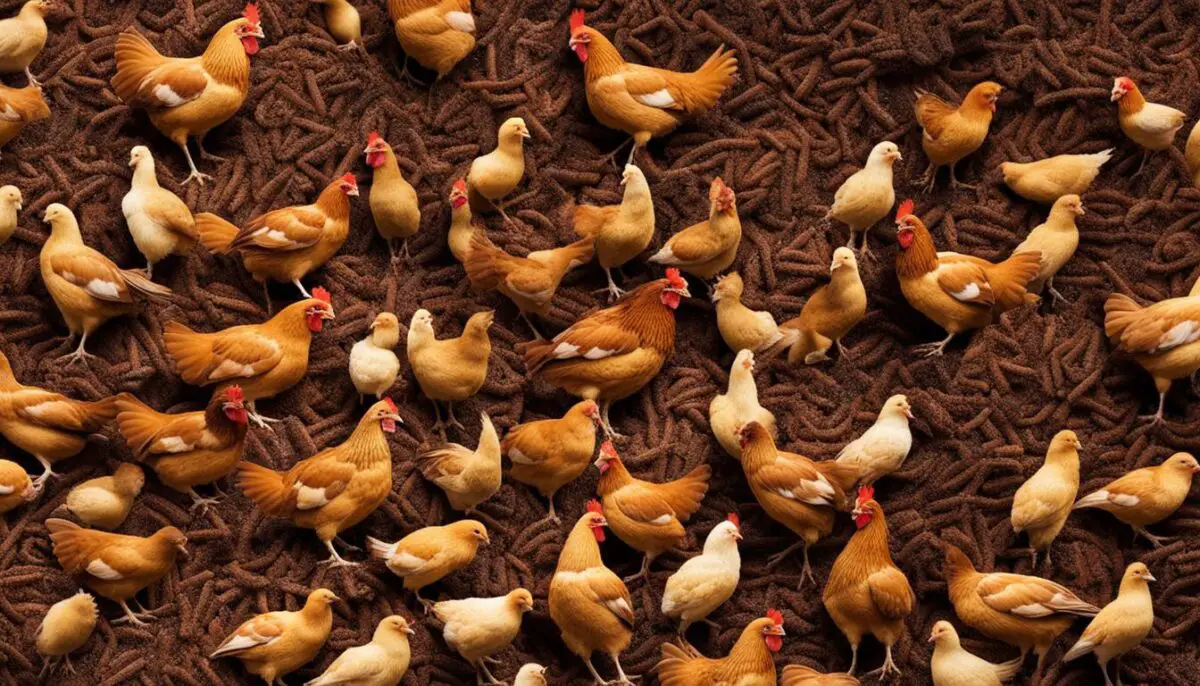
The Impact of Chicken Feed Regulations in Different Countries
Chicken feed regulations vary between countries, with different approaches taken to ensure the safety and quality of chicken products. In the European Union (EU), feeding mealworms and other insect proteins to chickens is illegal due to concerns about disease transmission and the accumulation of contaminants. These regulations aim to protect both the health of the chickens and the consumers of their meat and eggs. It is important for individuals in the EU to be aware of and comply with these regulations.
In contrast, the United States does not have specific regulations prohibiting the feeding of mealworms to chickens. However, it is crucial to note that local regulations may still apply. It is recommended that individuals in the US consult their state or local authorities or poultry extension offices for information on any guidelines or restrictions that may be in place.
| Country | Regulations |
|---|---|
| European Union (EU) | Feeding mealworms and other insect proteins to chickens is illegal. |
| United States | No specific regulations prohibiting the feeding of mealworms to chickens, but local regulations may apply. |
It is important for individuals who are considering feeding mealworms to their chickens to understand and abide by the regulations in their respective countries or regions. Compliance with these regulations helps to ensure the well-being of the chickens and the safety of the resulting food products. Stay informed and prioritize the health and welfare of your chickens by following the guidelines set forth by the relevant authorities.
The Nutritional Needs of Chickens
When it comes to the nutritional needs of chickens, protein plays a crucial role in their growth and overall health. While mealworms are a popular source of protein for many chicken owners, it is important to understand that chickens can obtain sufficient protein from other sources as well.
Commercial chicken feed is specially formulated to provide the necessary nutrients for chickens, including protein. These feeds are designed to meet the nutritional requirements of different types of chickens at various stages of their lives. Grains, such as corn and wheat, along with legumes like soybeans, also contribute to the protein intake of chickens.
Table:
| Protein Sources for Chickens | Protein Content |
|---|---|
| Commercial Chicken Feed | Varies depending on the brand and type of feed |
| Grains (corn, wheat) | 10-15% |
| Legumes (soybeans) | 30-40% |
While mealworms can be a valuable source of protein and can provide variety in a chicken’s diet, they are not essential for meeting their protein requirements. It is important to provide a balanced diet that includes a combination of commercial chicken feed, grains, legumes, and other suitable food options to ensure that chickens receive the necessary nutrients for their well-being.
By understanding the nutritional needs of chickens and providing them with a well-balanced diet, you can help ensure their optimal health and productivity. Always consult with a poultry nutritionist or veterinarian for specific dietary recommendations for your chickens based on their breed, age, and stage of development.
Other Foods to Avoid Feeding to Chickens
Feeding chickens a balanced diet is essential for their health and well-being. While it is important to provide them with nutritious food, there are certain foods that should be avoided as they can be potentially harmful to chickens. In addition to mealworms, there are other foods that are illegal to feed to chickens, particularly in the EU.
Foods Illegal to Feed Chickens in the EU:
- Kitchen scraps and table scraps: It is illegal to feed hens leftover food from the kitchen or table. These scraps can contain contaminants, pathogens, or substances that are harmful to chickens.
- Raw or undercooked meat: Feeding raw or undercooked meat to chickens is prohibited as it can increase the risk of disease transmission.
- Processed foods: Chickens should not be fed processed foods such as sugary snacks, fast food leftovers, or highly processed snacks. These foods lack nutritional value and can lead to health problems in chickens.
- Unwashed produce: Feeding chickens unwashed fruits and vegetables can introduce contaminants or pesticides into their diet, posing a risk to their health.
“Feeding chickens a balanced and safe diet is crucial for their overall health. It is important to be aware of the specific regulations in your country or region to ensure you are providing chickens with appropriate and legal foods.”
By avoiding these foods and focusing on providing chickens with a well-balanced diet consisting of commercial chicken feed, grains, legumes, greens, and clean water, you can help ensure their optimal health and productivity. It is always recommended to consult local guidelines and regulations to ensure compliance and the well-being of your chickens.
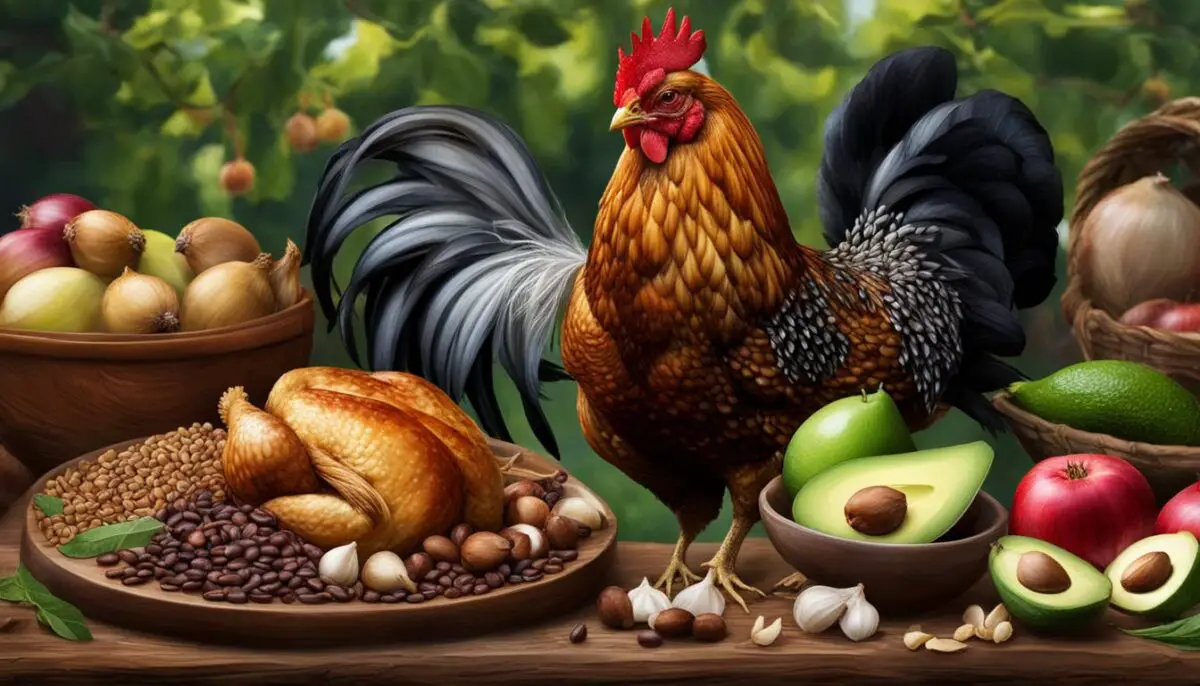
| Foods | Why They Should Be Avoided |
|---|---|
| Kitchen scraps and table scraps | Potential contamination and introduction of harmful substances |
| Raw or undercooked meat | Increased risk of disease transmission |
| Processed foods | Lack of nutritional value and potential health problems |
| Unwashed produce | Potential introduction of contaminants or pesticides |
The Benefits of Live Mealworms for Chickens
Live mealworms can provide several benefits for chickens in terms of nutrition and enrichment. Here are some key advantages to consider:
1. High Protein Content:
Live mealworms are rich in protein, making them an excellent natural source of this essential nutrient for chickens. Protein is crucial for muscle development, feather growth, and overall health. Adding live mealworms to their diet can help ensure that chickens receive an adequate amount of protein.
2. Enrichment and Foraging:
Chickens are naturally inclined to forage and peck at their surroundings. Live mealworms provide a stimulating and engaging activity for chickens, as they can peck at the wriggling worms, mimicking their natural foraging behavior. This enrichment can help reduce boredom and promote physical and mental well-being in chickens.
3. Nutritional Variety:
Incorporating live mealworms into a chicken’s diet can provide nutritional variety. While commercial chicken feed is formulated to meet the chicken’s basic nutritional needs, including live mealworms can add diversity to their diet and offer different flavors and textures.
| Benefits | Description |
|---|---|
| Nutritional Boost | The high protein content of live mealworms provides a nutritional boost for chickens, supporting their growth and overall health. |
| Enhanced Foraging | Live mealworms can stimulate natural foraging behavior in chickens, keeping them engaged and active. |
| Enrichment | Including live mealworms in their diet adds variety and enrichment to chickens’ daily meals. |
4. Source of Essential Fatty Acids:
Live mealworms are also a source of essential fatty acids, such as omega-3 and omega-6 fatty acids, which are beneficial for chickens’ overall health. These fatty acids play a vital role in maintaining healthy skin, feathers, and egg production.
It’s important to note that while live mealworms offer benefits for chickens, they should be fed in moderation and as part of a balanced diet. Consult with a poultry nutritionist or veterinarian to determine the appropriate quantity of live mealworms for your chickens based on their age, breed, and other dietary factors.
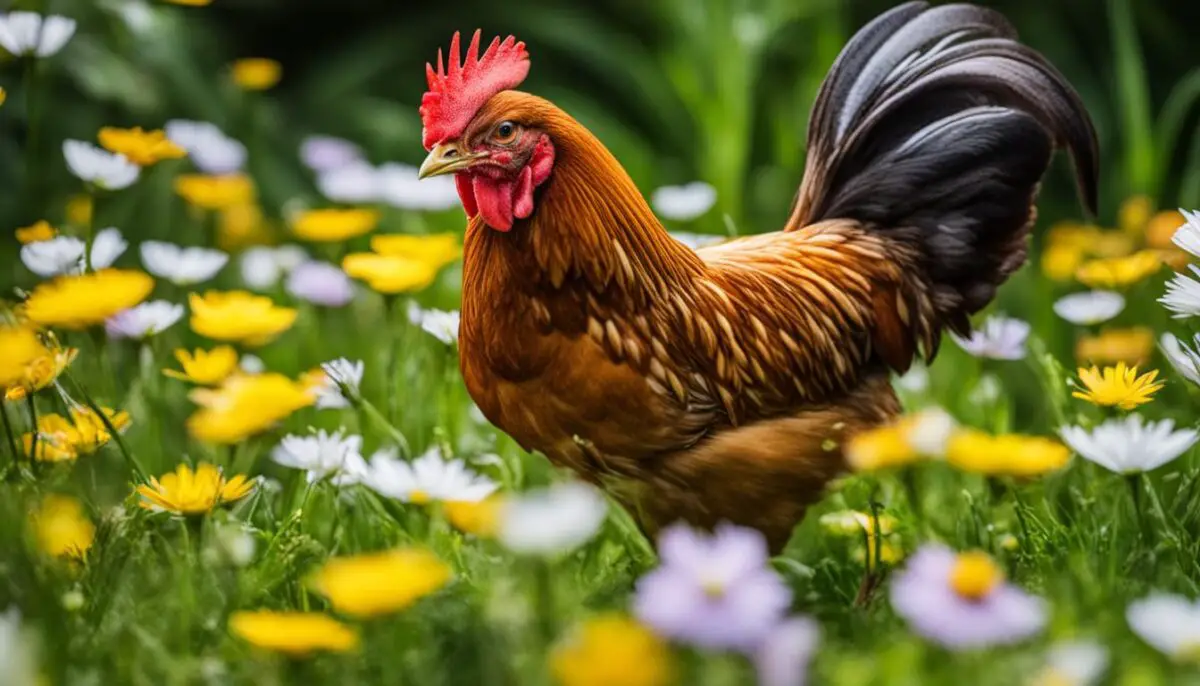
Homemade Mealworms for Chicken Feed
Growing mealworms at home can provide a safe and reliable source of chicken feed. With a few simple steps, you can set up your own mealworm farm and ensure the quality and safety of the feed for your chickens. Here’s a guide on how to grow mealworms for chicken feed:
- Setting Up the Mealworm Habitat: Start by preparing a suitable container for your mealworms, such as a plastic tub or a glass aquarium. Add a layer of substrate, such as wheat bran or oats, to provide a comfortable environment for the mealworms to live in.
- Introducing the Mealworms: Purchase a starter kit of mealworms or acquire adult mealworms from a reliable source. Place the adult mealworms in the habitat and provide them with food, such as grains or vegetable scraps, to ensure their survival and reproduction.
- Caring for the Mealworms: Keep the mealworm habitat in a warm and dark area, maintaining a temperature between 77-86°F (25-30°C). Ensure that the substrate remains dry but not too moist. Provide fresh food regularly and remove any moldy or spoiled food to prevent contamination.
- Harvesting the Mealworms: After a few weeks, the mealworms will have gone through their life cycle and transformed into pupae and then beetles. You can separate the beetles from the pupae and place them in a separate container to continue breeding. Harvest the pupae or beetles as chicken feed.
By growing mealworms at home, you have control over the quality and safety of the feed for your chickens. It also provides an opportunity for sustainability and self-sufficiency, as you can continuously breed mealworms to meet your chickens’ needs.
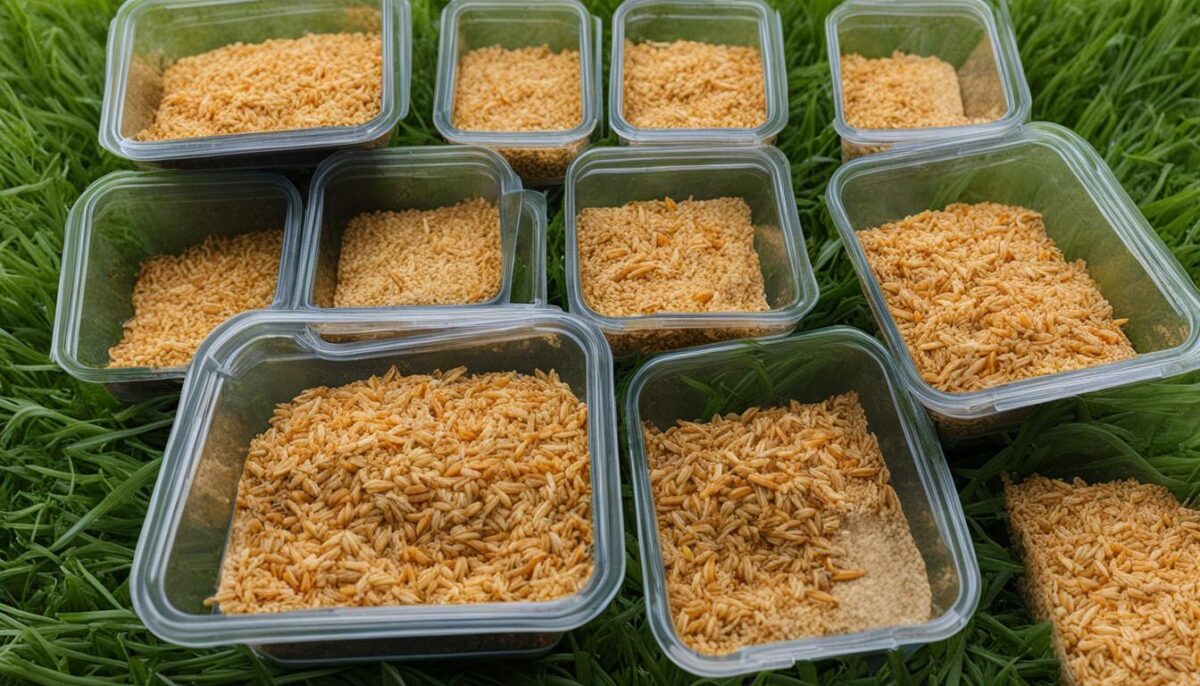
Benefits of Homemade Mealworm Farm
There are several benefits to setting up a homemade mealworm farm for chicken feed:
- Cost savings: Growing your own mealworms can be more cost-effective in the long run compared to purchasing commercially-produced chicken feed.
- Nutritional control: You have the ability to ensure that the mealworms are fed a healthy diet, resulting in high-quality protein for your chickens.
- Sustainability: By producing your own mealworms, you reduce your reliance on external sources and contribute to a more sustainable approach to feeding your chickens.
- Peace of mind: Knowing exactly what goes into the mealworms that your chickens consume provides peace of mind, as you have control over the feed’s safety and quality.
With a little time and effort, you can establish a homemade mealworm farm and provide your chickens with a nutritious and safe source of feed.
Where to Buy Mealworms for Chicken Feed
When it comes to purchasing mealworms for your chickens, it’s important to find reputable suppliers that prioritize the quality and safety of their products. Here are a few options to consider:
1. Online Suppliers
There are several online suppliers that specialize in providing high-quality mealworms for chicken feed. These suppliers often offer a wide range of options, including live mealworms, dried mealworms, and mealworm treats. It is recommended to read reviews and check the supplier’s website for information on their breeding and handling practices before making a purchase.
2. Local Farms or Hatcheries
If you prefer to support local businesses, you can try reaching out to farms or hatcheries in your area that sell mealworms specifically for chicken feed. This can be a great way to ensure the freshness and quality of the mealworms while also supporting your local community.
3. Pet Stores or Agricultural Supply Stores
Some pet stores or agricultural supply stores may carry mealworms for feeding chickens. These stores often have dedicated sections for poultry supplies and may offer various types of mealworms for your convenience. It’s worth checking with your local stores to see if they stock mealworms for chicken feed.
Remember to always inquire about the source of the mealworms and ask for any necessary documentation or certifications to ensure that they meet the necessary safety standards. By purchasing mealworms from reputable suppliers, you can provide your chickens with a safe and nutritious source of protein for their diet.
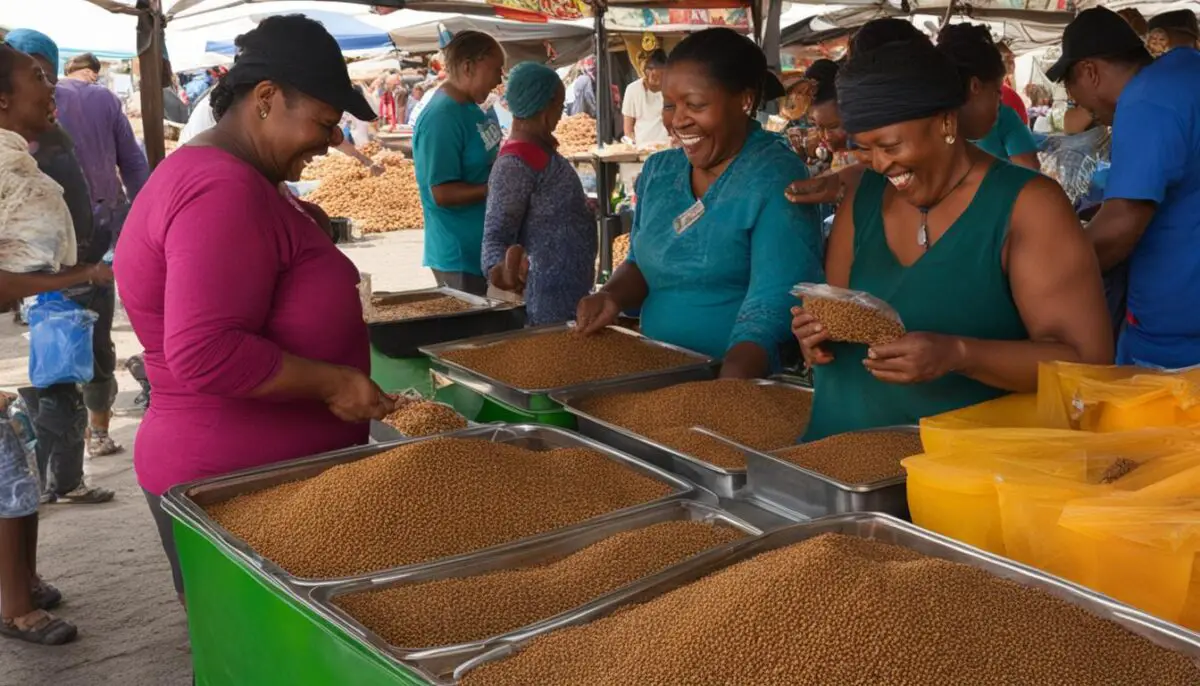
Conclusion
Feeding mealworms to chickens is a topic that sparks debate due to varying regulations and concerns about health risks. It is crucial to understand the regulations and considerations specific to your country or region when deciding whether to incorporate mealworms into your chickens’ diet.
While mealworms can provide a natural source of protein and stimulate foraging behavior, it is important to prioritize the safety and well-being of your chickens. Choosing high-quality sources of chicken feed and providing a balanced diet are essential for their health.
Remember, regulations regarding the legality of feeding mealworms to chickens can differ between countries. Stay informed about the guidelines in your area to ensure compliance and the safety of both your chickens and consumers of chicken products.
FAQ
Why is it illegal to feed chickens mealworms?
Feeding chickens mealworms is illegal in certain countries, including the UK and EU, due to health risks associated with contamination. Mealworms can be contaminated with bacteria, viruses, pesticides, heavy metals, and toxins. The regulations aim to protect both the chickens and the people consuming the meat and eggs produced by insect-fed chickens.
What are the health risks of feeding mealworms to chickens?
Feeding mealworms to chickens can pose several health risks. Mealworms may carry bacteria or viruses that can be harmful to chickens and humans. They can also contain harmful levels of heavy metals and toxins. In addition, mealworms may have been fed on banned substances and growth promoters, and have the potential to accumulate pesticides and other contaminants from their surroundings.
Why are there regulations in place for chicken feed?
Regulations regarding chicken feed are in place to ensure the safety and quality of the food produced by chickens. These regulations aim to prevent the introduction of disease, toxins, and contaminants into the chicken’s diet. It is important to follow these regulations to maintain the health and well-being of the chickens, as well as to ensure the safety of the consumers of chicken products.
What is the problem with feeding insect proteins to chickens?
The issue with feeding chickens insect proteins, such as mealworms, is the potential for disease transmission and contamination. Insect proteins can be a source of bacteria, viruses, and parasites that can be harmful to chickens. Additionally, there may be concerns about the quality and safety of the insect protein, including the source of the protein and any potential contaminants it may contain.
How do chicken feed regulations vary between countries?
Chicken feed regulations vary between countries. In the EU, it is illegal to feed mealworms and other insect proteins to chickens due to concerns about disease transmission and contaminant accumulation. In the USA, there are currently no specific regulations prohibiting the feeding of mealworms to chickens. However, it is important to be aware of any local regulations or guidelines that may apply.
Do chickens need mealworms to meet their protein requirements?
Chickens require a balanced diet that includes the necessary nutrients for their growth and health. While mealworms are a source of protein, it is not essential for chickens to consume mealworms to meet their protein requirements. Chickens can obtain sufficient protein from other sources, such as commercial chicken feed, grains, and legumes.
What other foods should not be fed to chickens?
In addition to mealworms, there are other foods that should not be fed to chickens. In the EU, it is illegal to feed hens kitchen scraps and table scraps. These foods can be potentially harmful to chickens and may introduce contaminants or pathogens into their diet. It is important to provide chickens with a balanced diet that meets their nutritional needs and avoids any potentially harmful foods.
What are the benefits of live mealworms for chickens?
Live mealworms can be a nutritious and engaging treat for chickens. They provide a natural source of protein and can stimulate foraging behavior in chickens. However, it is important to feed live mealworms in moderation and ensure they come from a reliable source to avoid any potential health risks.
How can I grow mealworms at home for chicken feed?
It is possible to grow mealworms at home to provide a safe and reliable source of chicken feed. Creating a homemade mealworm farm allows you to control the quality and safety of the mealworms. There are various methods and resources available online that can guide you through the process of setting up and maintaining your own mealworm farm.
Where can I buy mealworms for chicken feed?
If you prefer not to grow your own mealworms, there are reputable suppliers where you can purchase mealworms for your chickens. It is important to choose a supplier that ensures the quality and safety of their mealworms. Look for suppliers that provide detailed information about their breeding and handling practices to ensure you are getting a reliable source of chicken feed.
Is feeding chickens mealworms legal?
Feeding chickens mealworms can be a controversial topic due to varying regulations and concerns about health risks. It is important to understand the regulations and considerations in your specific country or region when deciding whether to feed mealworms to your chickens. Additionally, always prioritize the safety and well-being of your chickens by choosing high-quality sources of chicken feed and providing a balanced diet.


